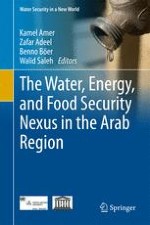2017 | OriginalPaper | Buchkapitel
8. Water-Energy-Food Security Nexus in the Arab Region: Thoughts and Policy Options
verfasst von : Paul Sullivan
Erschienen in: The Water, Energy, and Food Security Nexus in the Arab Region
Aktivieren Sie unsere intelligente Suche, um passende Fachinhalte oder Patente zu finden.
Wählen Sie Textabschnitte aus um mit Künstlicher Intelligenz passenden Patente zu finden. powered by
Markieren Sie Textabschnitte, um KI-gestützt weitere passende Inhalte zu finden. powered by
